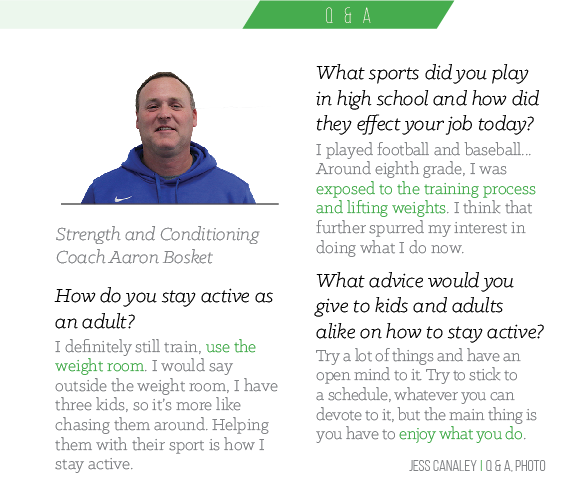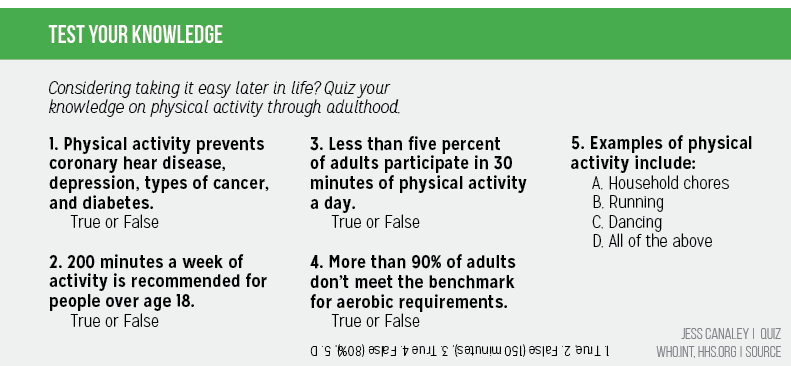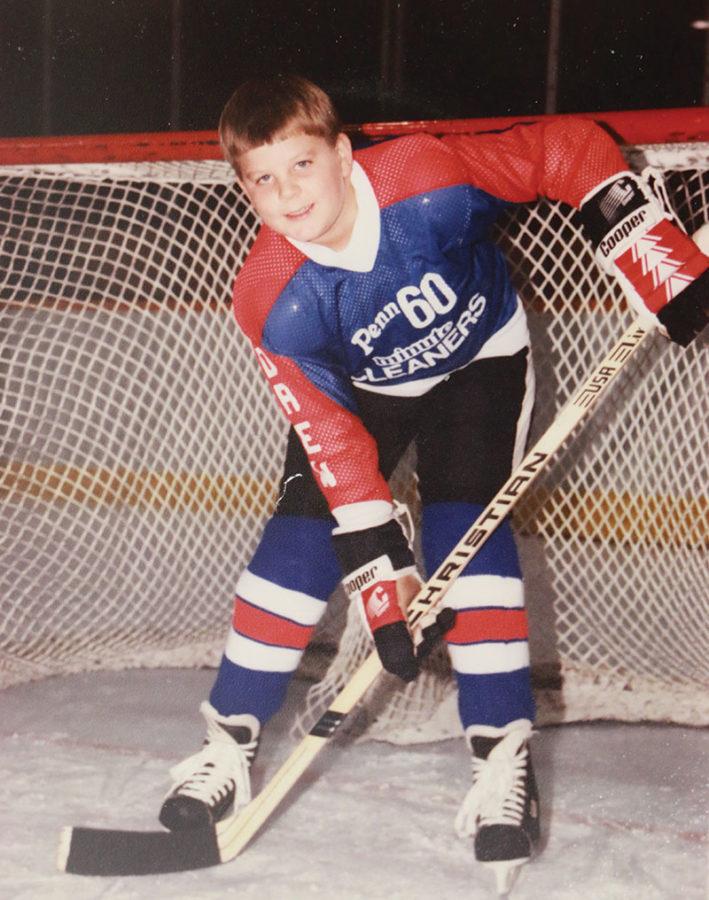When science teacher Drew Grimes laces up his skates before a hockey game at the Carmel Ice Skadium, stressors associated with teaching at school and dilemmas at home fade into an excitement for the matchup ahead. Grimes, along with other long-time friends in the league, have found new longevity by staying active in a sport years after their prime.
“The exercise and staying active is an important aspect of it all, but more importantly, it’s a fun group of guys and the camaraderie between all of us, as friends, is nice,” Grimes said.
Getting out of the house once a week to compete with friends is one of the most rewarding parts of playing in an adult league, as Grimes said it gives him an opportunity to regularly play with people of a similar skill level.
“It’s hard to be getting old,” Grimes said. “(The hardest part is) being able to skate and the other hardest part is just mental. Every year, you’re just a little bit slower. Every year, you fall down a little bit more and you just learn to be okay with that.”
Long after players peak in athleticism, the competitive driv e that pushed them to play years before sticks around, driving them to return to the sports they love.
e that pushed them to play years before sticks around, driving them to return to the sports they love.
“Playing in a competitive league with good players and just being around those kind of people is always good and helps me stay young as I get older,” AP Biology teacher Eric Rauch said. “It’s a great way to stay healthy mentally and physically and to take the edge off. It’s the same reason you play any game— because you enjoy it.”
Rauch, who coached Westfield High School’s men’s basketball team for 20 years, said he currently participates in recreational volleyball, basketball and golf leagues.
A 2010 study by Dr. Keith Zullig, chairperson of the department of behavioral sciences at West Virginia University, and Dr. Rebecca White, research fellow at the University of Chicago, found that U.S. adolescents who participated in team sports rated both their life satisfaction and physical health higher than their peers who did not participate in team sports.
This trend applies to older generations as well, according to Grimes. Year after year, he has returned to the ice for the companionship he has come to expect with the other men he competes with, regardless of their personal or collective skill in the game.
“I’m pretty terrible at hockey and I know that; we all know that. I play with a bunch of old guys who maybe used to be good, but (for) most of us, not really. There’s a good mix in the league I’m in because there are different tiers of play for different skill levels,” Grimes said.
Beyond Grimes’ limited skill in competing in hockey, he said he always has put forth the best example for his children when playing the game.
“When my kids watch me, I hope to set an example that it’s not about aspiring to be that one percent who will move on and play in college,” Grimes said. “But for the rest of us, I want them to see that it’s all about having fun and being to still play when you’re old. Playing and getting all you can out of an activity when you’re older is more important than being the very best at age 16.”
While Grimes and Rauch competed as high school athletes years ago, the look and feel of the game has remained constant even after their hiatus from the game.
“I hope I set a good example when any younger guys see me play,” Rauch said. “It’s really something you can do for a long period of time and the healthy lifestyle that comes with this participation is important.”
In participating in these leagues for years, both Rauch and Grimes said they intend to keep playing for years to come and not slow down with age.
“A couple of the guys I play with are in their 60s, some even in their 70s,” Grimes said. “A dream of mine is to just keep playing until I physically can’t, or I fall down too much, break a hip one too many times. It’s about having fun; that’s not going to change.”

































![AI in films like "The Brutalist" is convenient, but shouldn’t take priority [opinion]](https://hilite.org/wp-content/uploads/2025/02/catherine-cover-1200x471.jpg)









































![Review: “The Immortal Soul Salvage Yard:” A criminally underrated poetry collection [MUSE]](https://hilite.org/wp-content/uploads/2025/03/71cju6TvqmL._AC_UF10001000_QL80_.jpg)
![Review: "Dog Man" is Unapologetically Chaotic [MUSE]](https://hilite.org/wp-content/uploads/2025/03/dogman-1200x700.jpg)
![Review: "Ne Zha 2": The WeChat family reunion I didn’t know I needed [MUSE]](https://hilite.org/wp-content/uploads/2025/03/unnamed-4.png)
![Review in Print: Maripaz Villar brings a delightfully unique style to the world of WEBTOON [MUSE]](https://hilite.org/wp-content/uploads/2023/12/maripazcover-1200x960.jpg)
![Review: “The Sword of Kaigen” is a masterpiece [MUSE]](https://hilite.org/wp-content/uploads/2023/11/Screenshot-2023-11-26-201051.png)
![Review: Gateron Oil Kings, great linear switches, okay price [MUSE]](https://hilite.org/wp-content/uploads/2023/11/Screenshot-2023-11-26-200553.png)
![Review: “A Haunting in Venice” is a significant improvement from other Agatha Christie adaptations [MUSE]](https://hilite.org/wp-content/uploads/2023/11/e7ee2938a6d422669771bce6d8088521.jpg)
![Review: A Thanksgiving story from elementary school, still just as interesting [MUSE]](https://hilite.org/wp-content/uploads/2023/11/Screenshot-2023-11-26-195514-987x1200.png)
![Review: "When I Fly Towards You", cute, uplifting youth drama [MUSE]](https://hilite.org/wp-content/uploads/2023/09/When-I-Fly-Towards-You-Chinese-drama.png)
![Postcards from Muse: Hawaii Travel Diary [MUSE]](https://hilite.org/wp-content/uploads/2023/09/My-project-1-1200x1200.jpg)
![Review: "Ladybug & Cat Noir: The Movie," departure from original show [MUSE]](https://hilite.org/wp-content/uploads/2023/09/Ladybug__Cat_Noir_-_The_Movie_poster.jpg)
![Review in Print: "Hidden Love" is the cute, uplifting drama everyone needs [MUSE]](https://hilite.org/wp-content/uploads/2023/09/hiddenlovecover-e1693597208225-1030x1200.png)
![Review in Print: "Heartstopper" is the heartwarming queer romance we all need [MUSE]](https://hilite.org/wp-content/uploads/2023/08/museheartstoppercover-1200x654.png)




